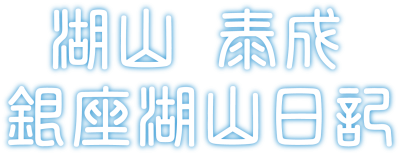Human ethics

I’m planning a Koyama G40th anniversary magazine, and I’m consulting with an old friend of the magazine company.
I thought I’d ask him to edit this diary, but the person in charge pointed out that the story about the Genesis of Koyama G was interesting after the interview with me.
At the age of 28, as the owner of a small and medium-sized hospital that went bankrupt, I hired my father as the director and took out debt.
After the bond, he created a national health care center.
The story of the failure, the struggle, and the staff who became friends who went through it.
It’s a drama like One Piece.
Certainly, it was a series of dramas.
This time, I asked him to compose a story based on interviews with executives from that time.
It’s too painful for me to speak for myself.
There are also memories that are sealed in the bottom of my heart.
It will take until next spring, but I would like to have it in shape this term.
The editor was interested in the master’s thesis at graduate school.
By all means, it was hoped that I would like to read it.
Say you’re interested.
It was already 30 years ago, when I was a working student and started Koyama G.
At that time, as a manager, I was lost in life and was attending church every week.
He was interested in Christian hospices and thought that medicine needed a religious view.
Actually, I wanted my own emotional support.
It was around that time that I read a lot of religious books.
Even if I studied religion from books as history and philosophy, I could not become a religious person myself.
At the time, he attended seminars on that sort of thing at the institute where he learned the philosophy of business people.
Big corporations wanted their would-be executives to attend overnight seminars on philosophy and ethics.
Not very well known.
Professor Emeritus of the University of Tokyo was a lecturer.
The board members of famous large companies were the directors, and the employees who would eventually become the presidents of those companies participated.
I think it was the president’s order, not his own wish.
We may not be able to afford that kind of executive training now.
After participating in the seminar, I decided to study seriously, and attended the lecturer’s graduate school class.
I heard that the professor emeritus was the only Japanese who gave a lecture to the Pope of the Vatican.
I also remembered that the teacher’s essay was taken up in my high school ethics textbook.
Anyway, he was a great professor, and although I only listened to him in the last seat in the seminar, I felt that I had come into contact with the mere skeleton of the real academic field called ethics.
A few years later, it was time for the professor to retire, and he told me to write a graduation thesis.
I said it was impossible, but I was the last student, so just send it out, and I’ll read whatever you want.
In the end, I put together my lecture notes and meeting materials, and submitted something that looked like a thesis, like a telephone directory.
The title is Management Philosophy of Medical Welfare.
The professor was at a loss.
When I consulted with a colleague, a professor of management, he said that he would approve without complaint as a management science.
But, as a philosophy, I’m holding my head on what to do.
Finally, as a token of mercy, he gave me a master’s degree.
To me, he was a wonderful mentor.
He always said he wanted to be a philosopher, not a philosopher.
Ideas, philosophies, and ethics are necessary for medical welfare.
I want medical care to study ecoethica.
It can’t be helped if people think it’s an excuse for a manager who can’t make money.
He wants to be a righteous manager who can never forgive the staff’s dishonesty, and he manages the business every day.
Only there, I want to gain the trust of the staff.
I searched the bookshelves for that paper, but fortunately I could not find it.
It’s too embarrassing, and I don’t think I accidentally threw it away.
I don’t want to be found like this forever.
For the honor of my mentor
Pulse oximeter 92/93/97
Body temperature 36.5 Blood sugar 223
Thinking does not lower blood sugar
CEO Yasunari Koyama
